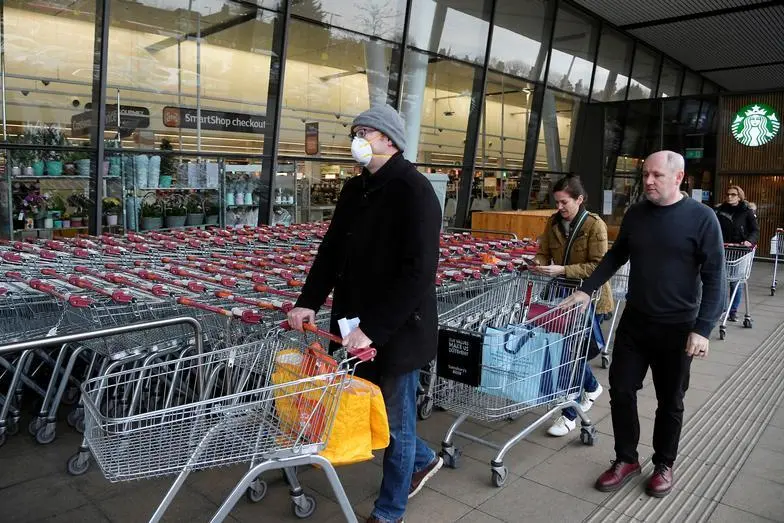PHOTO
Britain's economy grew in the fourth quarter of last year, official data showed on Friday, with a jump of business at travel agents and state support for soaring energy bills helping the country avoid falling into recession.
Economic output increased by 0.1% from the previous three months after shrinking by 0.1% in the third quarter, which was a smaller contraction than previously thought.
The Office for National Statistics (ONS) had previously said the economy showed no growth in the fourth quarter. Two consecutive quarters of contraction would have represented a recession.
Despite the improvement in the data, British economic output remained 0.6% below its level of late 2019, the only G7 economy not to have recovered from the COVID-19 pandemic.
"The economy performed a little more strongly in the latter half of last year than previously estimated, with later data showing telecommunications, construction and manufacturing all faring better than initially thought," ONS statistician Darren Morgan said.
Britain's dominant services sector rose by 0.1%, boosted by a nearly 11% jump for travel agents.
Manufacturing grew by 0.5%, driven by the often erratic pharmaceutical sector, and construction grew by 1.3%.
Household savings were boosted by the government's energy bill support scheme. The saving ratio rose to 9.3% of disposable income compared with its level of 5.6% just before the pandemic.
Households' disposable income increased by 1.3% after four consecutive quarters of negative growth.
The International Monetary Fund said in January that Britain was on course to be the only Group of Seven major advanced economy that will shrink in 2023, in part because of an inflation rate that remains above 10%.
But since then, economic data has come in stronger than expected by analysts.
Ruth Gregory at Capital Economics said the upward revisions to the GDP figures for the third and fourth quarters showed that high inflation took a slightly smaller toll on the economy than previously thought.
"But with around two-thirds of the drag on real activity from higher rates yet to be felt, we still think the economy will slip into a recession this year," she said.
House prices slid in March at the fastest annual rate since the financial crisis, mortgage lender Nationwide said.
The Bank of England (BoE) last week raised interest rates for the 11th consecutive meeting and investors are split on the possibility of another increase in May.
BUSINESS INVESTMENT FALLS
Despite the signs of resilience among households, the data suggested businesses remained cautious.
Business investment fell 0.2% in quarterly terms, a sharp downgrade from a first estimate of a 4.8% rise.
The ONS said changes to the way it calculates seasonal adjustments to the data were behind the big revision.
Earlier on Friday, a survey painted a more upbeat picture for businesses this month.
Finance minister Jeremy Hunt this month announced new incentives to encourage companies to invest although the tax breaks were less generous than a previous scheme and came just as corporate tax is due to jump in April.
The BoE said last week it expected Britain's economy contracted by 0.1% in the first three months of 2023 but it also said it thought GDP would grow slightly in the second quarter, having previously forecast a 0.4% contraction.
The outlook for Britain's economy has improved thanks in large part to falling international energy prices and a jobs market that continues to defy forecasts of a slowdown.
However, few analysts expect the economy to avoid a contraction over 2023 as a whole and the outlook could darken again if the recent turmoil in the global banking sector leads to lenders reining in loans.
The ONS said Britain posted a shortfall in its current account in the final three months of last year of 2.5 billion pounds ($3.1 billion), or 0.4% of GDP.
Excluding swings in precious metals, which can distort the data, the shortfall fell to 21.1 billion pounds, or 3.3% of GDP, down from 4.2% in the third quarter.
The ONS said increased foreign earnings by UK companies, particularly in the energy sector, helped narrow the deficit. ($1 = 0.8073 pounds) (Reporting by William Schomberg; editing by Andy Bruce, Robert Birsel)





















